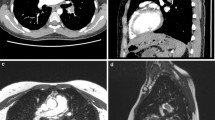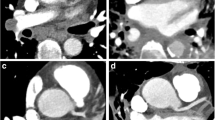Abstract
The feasibility and diagnostic value of real-time magnetic resonance imaging (RT-MRI) for the diagnosis of acute pulmonary embolism (PE) was evaluated by comparing RT-MRI and magnetic resonance angiography (MRA). In 39 consecutive patients with suspected PE real-time true fast imaging with steady-state precession (TrueFisp) was prospectively compared with contrast-enhanced MRA on a 1.5-T MR scanner. The TrueFisp sequence used allowed acquisition of T2-weighted images at 0.4 s per image so that the pulmonary vasculature could be visualized in three orientations in <3 min without the need for breath holding or contrast media application. Results of additional scintigraphic pulmonary perfusion examinations were available from 17 patients. All 39 primary RT examinations (100%) and 30 of 39 MRA examinations (77%) were of diagnostic quality. The reasons underlying failure to achieve diagnostic quality for MRA were breathing artifacts among dyspneic patients in all 9 cases. Compared with MRA, the sensitivities and specificities of RT sequences for PE were 93 and 100% (per examination), 96 and 100% (lobar artery PE), and 97 and 100% (segmental artery PE), respectively. Compared with scintigraphy, the sensitivity and specificity of RT-MRI were 83 and 100%, respectively. The MRA reached 100% sensitivity and specificity in this subgroup. The RT-MRI proved to be very robust and undisturbed by respiratory movements and patient cooperation. Its image quality assured fast diagnostic examinations, and its sensitivity and specificity, compared with MRA and scintigraphy, were sufficient to allow the diagnosis of acute central, lobar, and segmental PE; therefore, the emergency diagnosis of PE using RT-MRI is feasible and reliable.



Similar content being viewed by others
References
Anderson FA, Wheeler HB, Goldberg RJ, Hosmer DW, Forcier A, Patwardhan NA (1991) A population-based perspective of the hospital incidence and case-fatality rates of deep vein thrombosis and pulmonary embolism. The Worchester DVT study. Arch Intern Med 151:933–938
Carson JL, Kelley MA, Duff A, Weg JG, Fulkerson WJ, Palevsky HI, Schwartz JS, Thompson BT, Popovich J Jr, Hobbins TE, Spera MA, Abass Alavi RN, Terrin ML (1992) The clinical course of pulmonary embolism. N Engl J Med 326:1240
The PIOPED investigators (1990) Value of ventilation/perfusion scan in acute pulmonary embolism: results of prospective investigation of pulmonary embolism diagnosis (PIOPED). J Am Med Assoc 263:2753–2759
Stein PD, Athanasoulis C, Alavi A (1992) Complications and validity of pulmonary angiography in acute pulmonary embolism. Circulation 85:462–468
Remy-Jardin M, Remy J, Wattinne L, Giraud F (1992) Central pulmonary thromboembolism: diagnosis with spiral volumetric CT with the single-breath-hold technique: comparison with pulmonary angiography. Radiology 185:381–387
Schibany N, Fleischmann D, Thallinger C, Schibany A, Hahne J, Ba-Ssalamah A, Herold CJ (2001) Equipment availability and diagnostic strategies for suspected pulmonary embolism in Austria. Eur Radiol 11:2287–2294
Remy-Jardin M, Remy J, Artaud D, Deschildre F, Duhamel A (1997) Peripheral pulmonary arteries: optimization of the spiral CT acquisition protocol. Radiology 204:154
Schoepf UJ, Kessler MA, Rieger CT, Herzog P, Klotz E, Wiesgigl S, Becker CR, Exarhos DN, Reiser MF (2001) Multislice-CT imaging of pulmonary embolism. Eur Radiol 11:2278
Ghaye B, Remy J, Remy-Jardin M (2002) Non-traumatic thoracic emergencies: CT diagnosis of acute pulmonary embolism—the first 10 years. Eur Radiol 12:1886–1905
Meaney JFM, Weg JG, Chenevert TL, Stafford-Johnson D, Hamilton BH, Prince MR (1997) Diagnosis of pulmonary embolism with magnetic resonance angiography. N Engl J Med 336:1422–1427
Oudkerk M, van Beek EJR, Wielopolski P, van Ooijen PMA, Brouwers-Kuyper EMJ, Bongaerts AHH, Berghout A (2002) Comparison of contrast-enhanced magnetic resonance angiography and conventional pulmonary angiography for the diagnosis of pulmonary embolism: a prospective study. Lancet 359:1643–1647
Duerk JL, Lewin JS, Wendt M, Petersilge C (1998) Remember true FISP? A high SNR, near 1-second imaging method for T2-like contrast in interventional MRI at 2 T. J Magn Reson Imaging 8:203–208
Nitz WR (2002) Fast and ultrafast non-echo-planar MR imaging techniques. Eur Radiol 12:2866–2882
Miller S, Simonetti OP, Carr J, Kramer U, Finn JP (2002) MR imaging of the heart with cine true fast imaging with steady-state precession: influence of spatial and temporal resolutions on left ventricular functional parameters. Radiology 223:263–269
Pereles FS, McCarthy RM, Carr JC, Kapoor V, Krupinski EA, Finn JP (2002) Thoracic aortic dissection and aneurysm: evaluation with non-enhanced TrueFISP MR angiography in less than 4 minutes. Radiology 223:270–274
van Rossum AB, Pattynama PM, Ton ER, Treurniet FE, Arndt JW, van Eck B, Kieft GJ (1996) Pulmonary embolism: validation of spiral CT angiography in 149 patients. Radiology 201:467–470
Ruiz Y, Caballero P, Caniego JL, Friera A, Olivera MJ, Tagarro D, Alvarez-Sala R (2003) Prospective comparison of helical CT with angiography in pulmonary embolism: global and selective vascular territory analysis. Interobserver agreement. Eur Radiol 13:823–829
Ciccotosto C, Goodman LR, Washington L, Quiroz FA (2002) Indirect CT venography following CT pulmonary angiography: spectrum of CT findings. J Thorac Imaging 17:18–27
Gupta A, Frazer CK, Ferguson JM, Kumar AB, Davis SJ, Fallon MJ, Morris IT, Drury PJ, Cala LA (1999) Acute pulmonary embolism: diagnosis with MR angiography. Radiology 210:353–359
Reittner P, Coxson HO, Nakano Y, Heyneman L, Ward S, King GG, Baile EM, Mayo JR (2001) Pulmonary embolism: comparison of gadolinium-enhanced MR angiography with contrast-enhanced spiral CT in a porcine model. Acad Radiol 8:343–350
Seo JB, Im JG, Goo JM, Chung MJ, Moon WK, Lee KH, Kim IO (2003) Comparison of contrast-enhanced CT angiography and gadolinium-enhanced MR angiography in the detection of subsegmental-sized pulmonary embolism. Acta Radiol 44:403–410
Bergin CJ, Sirlin CB, Hauschildt JP, Huynh TV, Auger WR, Fedullo PF, Kapelanski DP (1997) Chronic thromboembolism: diagnosis with helical CT and MR imaging with angiographic and surgical correlation. Radiology 204:695–702
Barkhausen J, Quick HH, Lauenstein T, Goyen M, Ruehm SG, Laub G, Debatin JF, Ladd ME (2001) Whole-body MR imaging in 30 seconds with real-time TrueFISP and a continuously rolling table platform: fesasibility study. Radiology 220:252–256
Remy-Jardin M, Tillie-Leblond I, Szapiro D, Ghaye B, Cotte L, Mastora I, Delannoy V, Remy J (2002) CT angiography of pulmonary embolism in patients with underlying respiratory disease: impact of multislice CT on image quality and negative predictive value. Eur Radiol 12:1971–1978
Teigen CL, Maus TP, Sheedy PF, Stanson AW, Johnson CM, Breen JF, McKusick MA (1995). Pulmonary embolism: diagnosis with contrast-enhanced electron-beam CT and comparison with pulmonary angiography. Radiology 194:313–319
Morpurgo M, Schmid C (1995) The spectrum of pulmonary embolism: clinicopathologic correlations. Chest 107:18S–20S
Ghaye B, Szapiro D, Mastora I, Delannoy V, Duhamel A, Remy J, Remy-Jardin M (2001) Peripheral pulmonary arteries: How far in the lung does multi-detector row spiral CT allow analysis? Radiology 219:629–636
Van Beek EJR, Reekers JA (1999) Pulmonary angiography in the differential diagnosis of pulmonary embolism. Eur Radiol 9:1310–1316
Remy-Jardin M, Baghaie F, Bonnel F, Masson P, Duhamel A, Remy J (2000) Thoracic helical CT: influence of sub-second scan time and thin collimation on evaluation of peripheral pulmonary arteries. Eur Radiol 10:1297
Gotway MB, Patel RA, Webb WR (2000) CT for the evaluation of suspected acute pulmonary embolism: diagnostic pitfalls. J Comput Assist Tomogr 24:267–273
Goyen M, Laub G, Ladd ME, Debatin JF, Barkhausen J, Truemmler KH, Bosk S, Ruehm SG (2001) Dynamic 3D MR angiography of the pulmonary arteries in under four seconds. J Magn Reson Imaging 13:372–377
Matsuoka S, Uchiyama K, Shima H, Terakoshi H, Nojiri Y, Oishi S, Ogata H (2001). Detectability of pulmonary perfusion defect and influence of breath holding on contrast-enhanced thick-slice 2D and 3D MR pulmonary perfusion images. J Magn Reson Imaging 14:580–585
Abolmaali N, Hietschold V, Appold S, Ebert W, Vogl TJ (2002) Gadomer-17-enhanced 3D navigator-echo MR angiography of the pulmonary arteries in pigs. Eur Radiol 12:692–697
Author information
Authors and Affiliations
Corresponding author
Rights and permissions
About this article
Cite this article
Kluge, A., Müller, C., Hansel, J. et al. Real-time MR with TrueFISP for the detection of acute pulmonary embolism: initial clinical experience. Eur Radiol 14, 709–718 (2004). https://doi.org/10.1007/s00330-003-2164-5
Received:
Revised:
Accepted:
Published:
Issue Date:
DOI: https://doi.org/10.1007/s00330-003-2164-5




